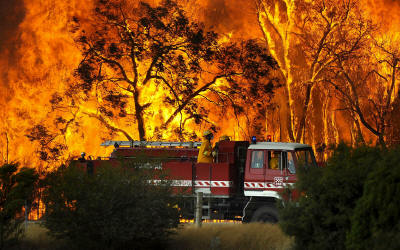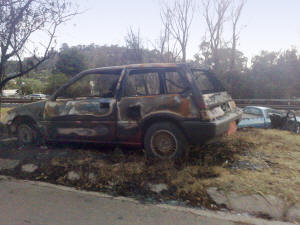Trials: Her Beauty and Her Terror
“I love a sunburnt country…
I love her far horizons, I love her jewel-sea
Her beauty and her terror …”1
So wrote Australian poet Dorothea Mackellar (1885-1968) while living in England and missing her beloved country. “Her beauty and her terror” encapsulates something that resonates in the Australian psyche. Australia’s beauty can be breathtaking, even stunning.
So can her terror.
In the beautiful Aussie bush, when over-abundant, rich fuel, dry heat, strong winds and any of a score of catalysts all merge into the perfect firestorm, “terror” is assuredly the word.
Absolutely the right word.
Along with cruel, vicious, merciless, unstoppable, inescapable, engulfing, overwhelming, capricious, unpredictable and sinister.
 “A nation reveals its true form in a crisis. The finery and fashion are stripped away. This is what the people are.” “A nation reveals its true form in a crisis. The finery and fashion are stripped away. This is what the people are.” |
The bushfires that swept through southeastern Australia in early February 2009 were the worst in our history. For those who escaped with their lives, what they’ve been left with is described by Gary Hughes, a journalist for The Australian, who lost his own home:
“White ash a few centimetres deep spread surprisingly evenly over a concrete floor slab. That’s what your life — everything you and your family owns, everything that makes you what you are, every memory and every treasured possession — becomes after you turn a blast furnace loose on it.
“A blast furnace so intense it melts window glass and sheets of roofing iron. A blast furnace so intense it shatters bricks. A blast furnace so intense a household fridge collapses in on itself like a crushed cardboard box…
“We expect to find virtually nothing left. We find even less.”2
Another writer, Greg Sheridan, observed,
“A nation reveals itself in a crisis. The artifice is stripped away, the finery and the fashion disappear. Here is the nation in its true form. This is what the people are.”3
Nobody invites crisis or disaster. And some people, communities, and nations cope far better than others.
Bushfires are an ever-present threat in Australia. So in the months to come, the nation will be unshocked, yet quietly grieving beyond the national memorial service and day of mourning, focused on comforting the victims, and grateful to the heroes of the emergency services and the nation as a whole for its customary huge outpouring of moral and financial aid. Aussie “mateship” is at its best when we face crises together.
Nowhere is this more evident than in the state of Victoria, which suffered worst. Greg Sheridan wrote,
“The Australians of the Victorian bushfires have revealed themselves to be magnificent, ordinary heroes. Practical, straightforward, remarkably tough, resilient under it all. In countless interviews on television and radio, it is stunning how often the survivors inject some laughter, some note of dry irony.”4
One survivor’s interview profoundly touched my Christian sensibilities. A husband, holding his young son, stood with his wife before the fire-bunker she’d nagged him to build for them beside a huge water-tank. He’d finished it shortly before they’d fled into its shelter. They huddled together inside, while outside, their entire world incinerated out of existence in minutes. Now, a TV reporter asked them what it felt like, emerging to find their home — everything — gone.
He responded: “We’re alive! Material things — forget it! We’re alive! We can start again.”
Indeed they are; no doubt they will.
Such spirit is awesome, appealing to and awakening the best in us.
It also inspires personal reflection.
Question: In a culture so keenly focused on material possessions, where personal debt is dangerously high, where financial factors can drive and colour people’s entire world-view, what is it that enables anyone to say “Material things — forget it!”?
Answer: “We’re alive!”
 Everything’s relative. When you’re rolling in luxury (so I’m told!) you can afford to focus on choosing between Beluga and Osetra caviar at next week’s soirée. When a wall of fire is bearing down on you at 200 miles an hour, though, the caviar decision becomes a tad less significant. Crisis and disaster have a knack for rearranging our priorities.
Everything’s relative. When you’re rolling in luxury (so I’m told!) you can afford to focus on choosing between Beluga and Osetra caviar at next week’s soirée. When a wall of fire is bearing down on you at 200 miles an hour, though, the caviar decision becomes a tad less significant. Crisis and disaster have a knack for rearranging our priorities.
Whatever else might (or not) help us become ever-more spiritually minded in an ever-more secular-minded world, the human spirit is capable of connecting with its destiny during, and immediately following, a crisis or disaster.
Crisis brings out at once the best and the worst. In this case, it brought out the best. Here was a man whose home and everything in it had been reduced to white ash a few inches deep — whose sole possessions now were the breeze-block bunker that had saved his family — and his core values. When the cup of life is shaken violently by severe crisis, your core values are what break free and float to the surface. There is something in that man’s nature or nurture that will now become the fountainhead of recovery for him and his little family.
Painful though it was, on one level this crisis created a magic moment. It enabled a man to say “Material things — forget it!”
Is he a Christian? I don’t know. It’s clear, though, that he understands what Jesus said, that “a man’s life does not consist in the abundance of his possessions.”5
It’s important to know what your core values are, because in a crisis, they are going to surface and play out — for better or worse.
Christians are blessed with a great deal of guidance about what our core values should be. When we are in crisis, what comes out should reflect the life and teachings of Jesus Christ. We gain valuable insights into the progress of our walk with God during such times. In easy times, we might coast along for years on the momentum of a self-image artificially fed by material well-being. But knowing how much we have actually grown up into him is unknowable — purely hypothetical — until “the artifice is stripped away,” the façades and masks drop off — and we are left with nothing but who and what we are.
As that family man, holding his young son and standing with his wife before the fire-bunker, starts to rebuild their life together, I wish him well — and sincere thanks. He’s reminded us all that when positive core values are in place, the terror of crisis can reveal beauty in the human spirit.
In this [salvation] you greatly rejoice, though now for a little while you may have had to suffer grief in all kinds of trials. These have come so that your faith — of greater worth than gold, which perishes even though refined by fire — may be proved genuine and may result in praise, glory and honor when Jesus Christ is revealed.6
1 Dorothea MacKellar, 1908, My Country. Online: www.dorotheamackellar.com.au/archive/mycountry.htm
2 Gary Hughes, “No Phoenix of Hope Arising From the Ashes of the Victoria Bushfires.” The Australian newspaper, Feb. 12, 2009. Online: www.theaustralian.news.com.au/story/0,25197,25042641-601,00.html. Accessed Feb. 26.
3 Greg Sheridan, “Crisis Survived, We Must Quickly Apply the Lessons.” The Australian newspaper, Feb. 12, 2009. Online: www.theaustralian.news.com.au/story/0,25197,25041835-24636,00.html.
4 Ibid.
5 Luke 12:15.
6 1 Peter 1:6-7.
Author: Kerry Gubb
